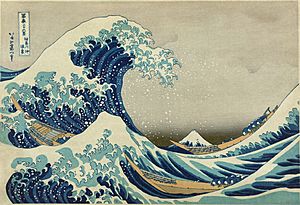The Great Wave off Kanagawa facts for kids
The Great Wave off Kanagawa is a famous Japanese woodblock print. It was created by the artist Katsushika Hokusai between 1830 and 1833. This was during a time in Japan known as the Edo period.
The print shows a huge wave about to crash down on three small boats. In the background, you can see Mount Fuji, a very famous mountain in Japan. The scene takes place near the Japanese area of Kanagawa. Hokusai made this artwork using a special printing method called ukiyo-e.
Contents
What is The Great Wave?
The Great Wave off Kanagawa is the first print in a series called Thirty-six Views of Mount Fuji. This series shows Mount Fuji from different angles and in different seasons. Even though the wave is the main focus, Mount Fuji is always there in the background.
The Art of Ukiyo-e
Ukiyo-e is a type of Japanese art that was popular from the 17th to the 19th centuries. It means "pictures of the floating world." Artists used woodblocks to create these prints. They would carve a design into a block of wood, then put ink on it and press it onto paper. This allowed them to make many copies of the same artwork.
How Woodblock Prints are Made
Making a woodblock print was a team effort. First, the artist would draw the design. Then, a carver would carefully cut the design into wooden blocks, one block for each color. Finally, a printer would apply ink to the blocks and press them onto paper to create the final image.
Hokusai's Life and Art
Katsushika Hokusai was a very important Japanese artist. He lived a long life, from 1760 to 1849. He started drawing when he was very young. Hokusai created many different types of art, including paintings, drawings, and woodblock prints. He is one of the most famous ukiyo-e artists.
Hokusai's Other Works
Besides The Great Wave, Hokusai made thousands of other artworks. He also created books with drawings, like the Hokusai Manga. These books were full of sketches of people, animals, and nature.
Impact and Legacy
The Great Wave off Kanagawa is one of the most recognized artworks in the world. It has inspired many other artists, musicians, and writers.
Influence on Western Art
When Japanese art, including ukiyo-e prints, became popular in Europe in the late 1800s, it greatly influenced Western artists. Many famous painters, like Vincent van Gogh and Claude Monet, were inspired by Hokusai's work. They loved the bold lines, flat colors, and unique viewpoints of Japanese prints.
The Wave in Pop Culture
You can see The Great Wave in many places today. It appears on clothing, posters, and even in movies and video games. It has become a symbol of Japanese art and culture around the world.
Images for kids
-
The Great Wave is part of Thirty-six Views of Mount Fuji. The Fine Wind, Clear Morning print, also known as Red Fuji, is also part of the series.
-
An early print of the Great Wave with a darker sky. This print is kept at the British Museum.
-
The Sea off Satta in Suruga Province by Hiroshige (1858), another famous ukiyo-e artist.
-
La Vague (The Wave) by Camille Claudel (1897), a sculpture inspired by the print.
-
The cover of Debussy's music piece La mer (1905), which was inspired by Hokusai's wave.
See also
 In Spanish: La gran ola de Kanagawa para niños
In Spanish: La gran ola de Kanagawa para niños











